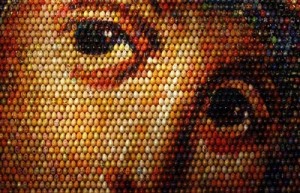“Just try to imitate the Blessed Virgin,” my old pastor would always counsel me. This was when I was a teenager struggling with all the usual teenager sins. The only thing I could see that Mary and I had in common was the color blue: her mantle, my hair. So his advice,  while technically excellent, was entirely unhelpful.
while technically excellent, was entirely unhelpful.
When I became a mother, I thought the imitation would come more naturally. But the opposite happened: The more I tried to imitate what I heard about Mary, the wider the gulf between us became. Imitate someone who was free from original sin, and so had no inclination to be impatient or sarcastic, self-pitying or lazy, lustful or arrogant? And whose Child, while clearly kind of a tricky case, never sinned either? Whose husband was a saint, and whose mission in life was clear as a bell?
And asking someone with four kids under the age of five to imitate a mother of one felt like asking someone who lives in a sod hut to be more like Martha Stewart. Imitate Mary? I might as well have tried to imitate a cirrus cloud, or pattern my life after a soap bubble or an innocent little butterfly. In Mary’s presence, I had to be on my best behavior, so as not to put a smudge on her pretty porcelain robes.
What baffled me was that so many other women clearly found such solace and strength in Mary. I knew that I must be missing something–that this wasn’t her fault, it was mine. I regretfully concluded that I just wasn’t one of those Mary People.
But my thinking has changed. Here’s the key: I was misunderstanding sin–and so, of course, misunderstanding Mary, conceived without sin.
Intellectually, I knew sin is the cause of all pain and suffering in the world; but emotionally, it just felt like sin was life. How could the Immaculate Conception be helpful at all with Real Life? I imagined Mary as a blank slate, a polished, glossy fondant of womanhood. Pretty to look at, but who can get a foothold in such a featureless landscape?
But here’s the thing. Mary was conceived without sin, but that clearly did not mean she didn’t suffer. Think of this: Sin, in a peculiar way, protects us. It makes a comfortable shield or buffer between us and the truth. When I hurt someone, I protect my conscience by telling myself that so-and-so deserved it, that I was tired or overworked, and not much to blame, that it wasn’t such a big deal, that I’ll do better next time, and so on.
If Mary, though, full of grace, saw someone hurting someone else, even in a minor way–she must have seen the full horror of it. Far from being dainty and pristine, detached and removed from the mess and struggle of the world, she must have seen with utter clarity what harm we do to each other, and to ourselves, and how we offend against God. Imagine a Civil War-era mother watching the battlefield from high ground: It’s all very well to be protected yourself, but how dreadful to witness all those wounds.
And then there is the matter of what happened to Mary’s Son. The closest I come to being a decent human being is when one of my children is hurt. That is when I’m most able to put aside my own needs and desires, and just do what I’m here to do: to help, to make it better, to work like a furious machine to right the wrong. This is because I love my children. I can see them better, I know them more than anyone else does–and because of what I know, I have the strength to fight for them.
So imagine Mary, who was the only one who could see her Child for who he really was–whose life was linked to His. Imagine not only seeing your child suffer, but knowing that he was the only truly innocent one in the world. A sword of sorrow is putting it mildly. In her immaculate state, she had no selfishness to work through, no “compassion fatigue”–only sheer, unmixed anguish at seeing the truth of the most outrageous injustice in the universe. Mary alone saw not only her Son’s suffering, but saw clearly how the whole world was wounding itself as it tortured and killed this innocent one. She was not shielded by sin; she saw.
Mary is not, in her immaculate state, detached from us. On the contrary, she sees us–she sees more than anyone else sees. This is why she loves us: not because she is nice enough to blink politely and pretend not to notice our human grotesqueries–but because she sees it all, the good and the bad. She knows us better than anyone else, and she loves us because of what she knows, not despite it. When we cry to her, she doesn’t gather up her mantle to keep it free of our filth–she scoops us up like any mother would, and holds us tight until we feel strong enough to stand on our own again.
And so this is how I pray to Mary: Help me see my children clearly. Help me to see as Mary sees. Sin blinds and divides us; but grace reveals, and grace gives us strength.
by Simcha Fisher: To read more from Simcha go to www.NCRegister.com




